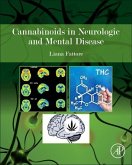Nearly 44 million people have Alzheimer's or related dementia worldwide, according to the Alzheimer's Disease International organization. That number is expected to double every 20 years. Unlike other books on the market, Alzheimer's Disease: Understanding Biomarkers, Big Data, and Therapy covers recent advancements in cognitive, clinical, neural, and therapeutic aspects of Alzheimer's and other forms of dementia.
First, readers are introduced to cognitive and clinical studies, focusing on the different types of memory impairment, past and future thinking. This includes the prevalence of depression, its relationship to other symptoms, and the quality of life for those with Alzheimer's disease. In addition, the book discusses recent studies on memory dysfunction in advanced-stage Alzheimer's disease, in comparison to early-stage, including a chapter on the underlying factors in the transition from mild cognitive impairment to Alzheimer's diagnosis. Following this section, the book presents recent studies on the role of different cortical and subcortical structures in the development of various symptoms in Alzheimer's disease, as well as different neural biomarkers underlying the development and treatment of the disease. In the last section of the book, therapeutic aspects of Alzheimer's disease, focusing on behavioral and pharmacological treatments of sleep disorders, memory problems, and depression, are reviewed. The book aids readers in understanding the advances in research and care, making it a prime tool for all clinicians, psychologists, researchers, neurologists, and caregivers of dementia patients.
First, readers are introduced to cognitive and clinical studies, focusing on the different types of memory impairment, past and future thinking. This includes the prevalence of depression, its relationship to other symptoms, and the quality of life for those with Alzheimer's disease. In addition, the book discusses recent studies on memory dysfunction in advanced-stage Alzheimer's disease, in comparison to early-stage, including a chapter on the underlying factors in the transition from mild cognitive impairment to Alzheimer's diagnosis. Following this section, the book presents recent studies on the role of different cortical and subcortical structures in the development of various symptoms in Alzheimer's disease, as well as different neural biomarkers underlying the development and treatment of the disease. In the last section of the book, therapeutic aspects of Alzheimer's disease, focusing on behavioral and pharmacological treatments of sleep disorders, memory problems, and depression, are reviewed. The book aids readers in understanding the advances in research and care, making it a prime tool for all clinicians, psychologists, researchers, neurologists, and caregivers of dementia patients.
"...covers many topics related to Alzheimer's disease, [including] relevant psychiatric illnesses associated with Alzheimer s, advances in research and technological contributions, and current treatments in people with dementia . [H]elps readers to understand how psychological research is being performed in Alzheimer's disease patients [and] does a great job in pointing out the difficulty in performing such research as dementia studies require more longitudinal collection of data [It] suggests possible solutions of using big database research methods to accelerate new findings in the field, useful to readers who design research studies in Alzheimer's diseases . [P]rovides disease pathology in relatively easy-to-understand phrases based on recent literature and discusses research models in which the disease can be studied best. Compared to other books that talk about the specific biochemical neuropathophysiology, [this] provides a much more general overview and psychological aspect of Alzheimer's disease." --©Doody s Review Service, 2023, Jane Lee, MD (Northwell Health)








